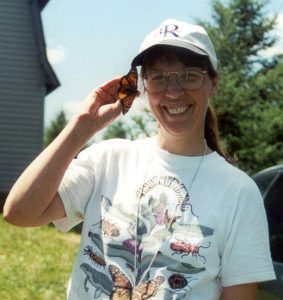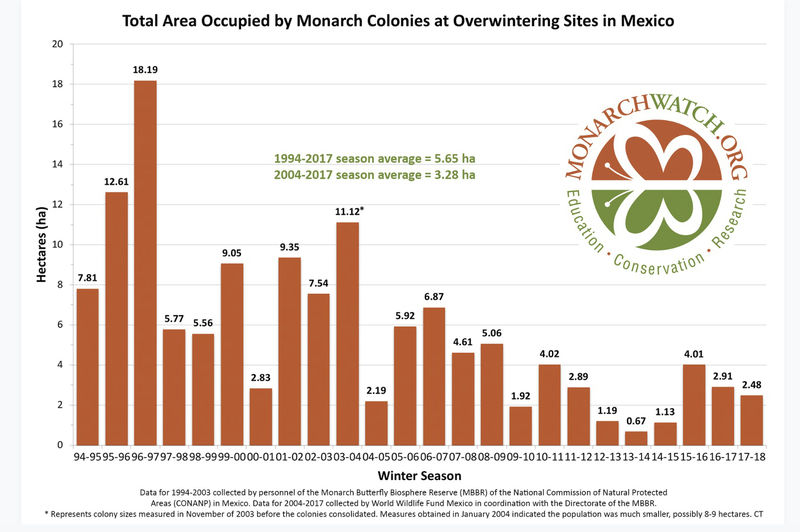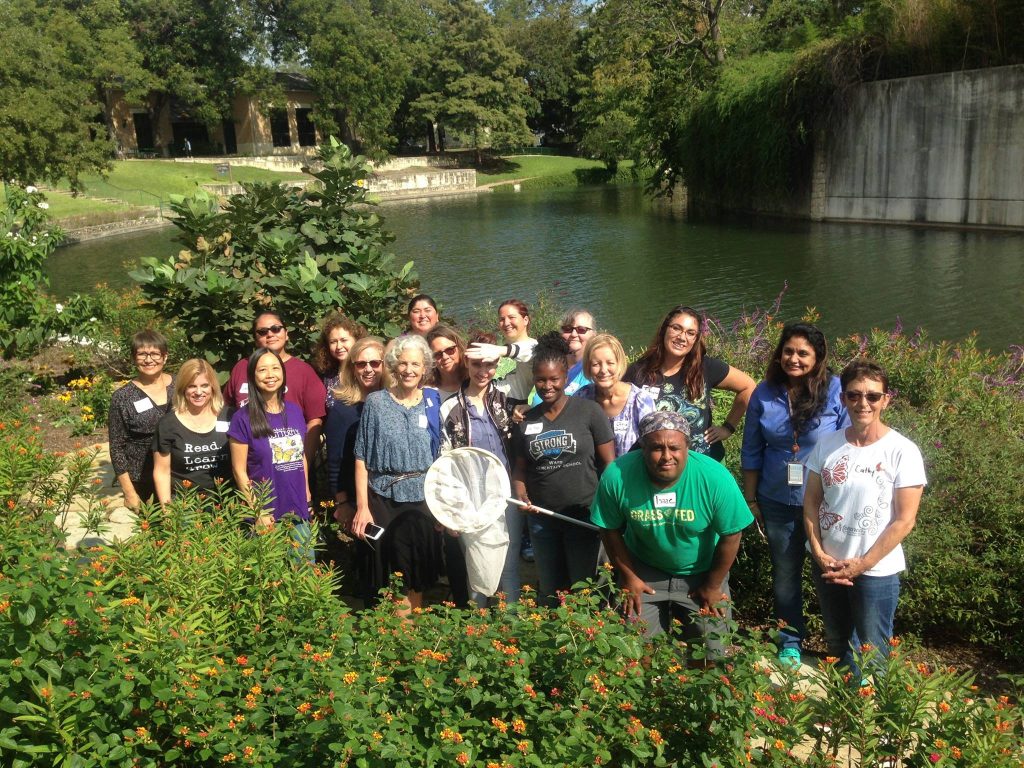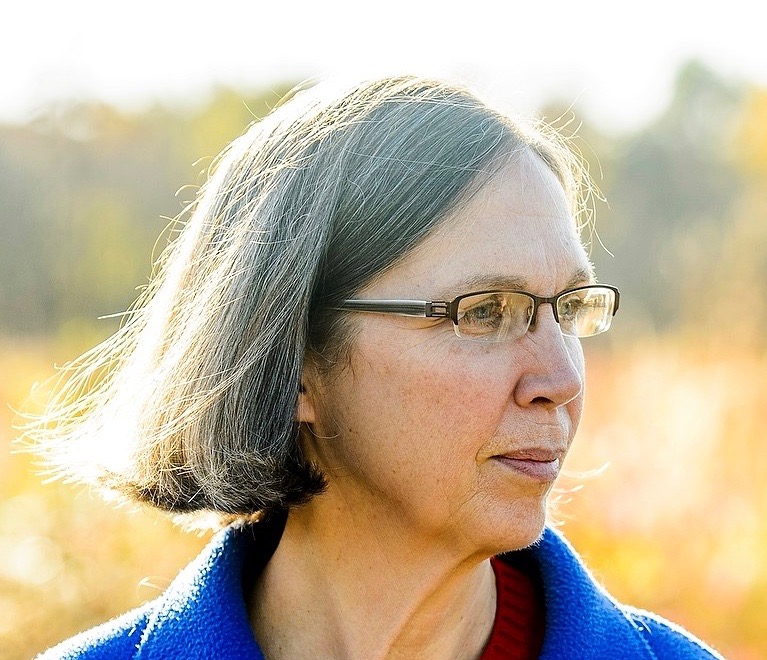
Karen Oberhauser has been studying monarch butterflies for decades. –Photo courtesy Oberhauser Lab
As cofounder of Monarch Joint Venture and the current Director of the Arboretum in Madison, Wisconsin, Oberhauser has been studying the iconic orange and black insects for decades. She will join us in San Antonio on October 19 for a panel discussion, Butterflies without Borders: the Monarch Migration and our Changing Climate.
Oberhauser, one of the foremost experts on monarch butterfly biology and their migration, took her first group of graduate students to the monarch butterfly overwintering sites in 1997. That year marked the historic peak of the migrating monarch population, a benchmark from which we measure the health of the migration today.
Almost a billion butterflies clustered in a small patch of forest inside what is now the Monarch Butterfly Biosphere Preserve, scientists estimate. Oberhauser compared the vivid experience to scuba diving in an evergreen forest of sensory immersion.

When Oberhauser first visited the roosting sites, the migrating monarch butterfly population was at its peak. Graph via Monarch Watch
Butterflies covered every available surface, surrounding her group with movement in every direction, recalled Oberhauser in a recent interview. Small movements of wings sent ripples through the forest. And the smell? Indescribable.
“The trees are filled with butterflies, resting, excreting, and sometimes dying and falling to the ground. The smell is hard to explain…it just smells like monarchs,” said Oberhauser. She added that since she’s spent plenty of time raising and handling monarchs, “I have that smell in my head. It’s just the smell of monarchs, what else can I say?”
Oberhauser’s decades of studying monarchs have taken her far and wide. Currently, she operates from her home in Wisconsin where she serves as the director of the University of Wisconsin-Madison’s Arboretum, a job once held by the father of wildlife ecology, Aldo Leopold. She’s visited the monarchs in the forests of Michoacán in Mexico, studied them upon their return in New England, and observed them in San Antonio moving through our Texas Funnel.
This year, she’ll join three other stellar speakers for the third annual three-day Monarch Butterfly and Pollinator Festival as one member of an expert panel at the Butterflies Without Borders Forum on October 19. The panel will tackle the status of the monarch migration, climate change, the influence of GMOs and pesticides, and the controversy surrounding the border wall which is proposed to plow through the National Butterfly Center in Mission, Texas, along the Texas-Mexico border. Tickets available here.
Oberhauser brings a deep understanding of the monarch migration, citizen science, and the monarch butterfly life cycle and biology. She received her undergraduate degree in biology from Harvard, then earned her Ph.D in Ecology and Behavioral Biology from the University of Minnesota. There, she took an interest in butterflies as a means of studying material investment of parents in their offspring.
Since, she has served as a professor, authored several books on monarch butterfly biology and conservation, and cofounded Monarch Joint Venture (MJV). In 2013 she was named Champion of Change for Citizen Science by President Barack Obama.
MJV works as a sort of United Way for Monarch butterfly-focused nonprofits, funding research and lending credibility to more than 65 organizations under its umbrella. Public and private entities make up the MJV roster, including migration and citizen science tracking organization Journey North, tagging program and monarch conservation organization Monarch Watch, and Monarch Lab, an organization also founded by Oberhauser at the University of Minnesota. The Monarch Butterfly Fund, which works to preserve overwintering sites in Mexico and the National Wildlife Federation also belong to MJV.

Oberhauser will lead a teacher training workshop October 20 for public school teachers sponsored by the San Antonio River Authority and the Texas Butterfly Ranch. Above, last year’s class. Photo by San Antonio River Authority
The week prior to the Forum and Festival, Oberhauser will serve as a visiting scholar at Trinity University. She will also lead a teacher training workshop at Confluence Park from 9 AM – 12 PM on Saturday, October 20. The program will be free to educators. Registration details coming soon.
Though the future of the iconic monarch butterfly migration appears uncertain, Oberhauser remains hopeful about the insects’ future.
“As long as people really work on creating and preserving habitats for monarchs, they have a really good chance of surviving, and the reason that I think that’s true is that they’re a very resilient species,” she said.
To hear Oberhauser and our panel of distinguished experts discuss monarch butterflies, their migration, and their conservation, join us at the Butterflies without Borders Forum on October 19. Tickets available here.
Karen Oberhauser’s visit to San Antonio is made possible in part by Trinity University, the San Antonio River Authority and Monarch Joint venture.
TOP PHOTO: Karen Oberhauser, Director of the University of Wisconsin-Madison’s Arboretum. Courtesy photo
Related posts:
- Butterflies without Borders set for October 19-21
- Monarch butterflies tagged at Festival recovered in Mexico
- Monarch Butterfly Festival 2017 soars in San Antonio
- San Antonio’s first Monarch Butterfly and Pollinator Festival a roaring success
- Border wall at National Butterfly Center violates property rights and worse
- Climate Change and the Monarch Butterfly Migration Symposium tackles tough questions
- McAllen becomes second NWF Monarch Butterfly Champion City
- South Texas a great base for sojourn of bees, butterflies and birds
- Monarch Champion status not “just talk,” will change how San Antonio manages land
Like what you’re reading? Don’t miss a single post from the Texas Butterfly Ranch. Sign up for email delivery, like us on Facebook, or follow us on Twitter, @monikam.



Karen, I am Jack Treahy, and i live in San Diego, CA and I am approx 15 to 18 miles from the ocean. I have 6 pots of tropical milkweed, and I had so much activity on the plants that I could not keep them surviving to support the manarchs. I found that going to the botanical gardens in Balboa Park a plant ‘Calatropis Gigantia’ giant milkweed that was supporting a huge population of Monarchs in all their differant forms. I tried to get the plant for myself here in San Diego, but was unsuccessful. I did get the plant from Vine in Florida. But the butterflies do not seem to be attracted to this plant, as they are in Balboa Park. Do you have any experiance with this issue? Thank you very much. Jack Treahy
Hi Karen i am Lonnie Travers i live in Taunton Massachusetts i was just looking in the pine bush on the side of my house it has about 50 to 100 cocoons i think they are Butterflys but not to sure is there a wed site i can send you a pitcher of them and mabe you might know Thank You